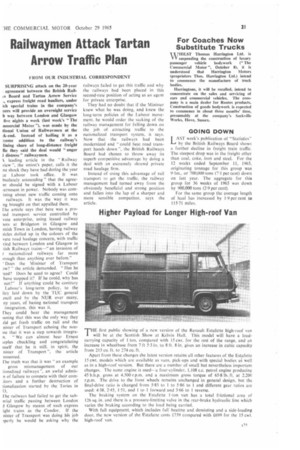Railwaymen Attack Tartan Arrow Traffic Plan
Page 23

If you've noticed an error in this article please click here to report it so we can fix it.
FROM OUR INDUSTRIAL CORRESPONDENT
SURPRISING attack on the 20-year agreement between the British Railvs Board and Tartan Arrow Service ., express freight road hauliers, under ich special trains in the company's airs will provide an overnight service h way between London and Glasgow five nights a week (last week's "'the mmercial Motor "), was made by the tional Union of Railwaymen at the !k-end. Instead of hailing it as a [come addition to the railway's lining share of long-distance freight !fie they said the deal would "anger I distress" railwaymen.
k leading article in the " Railway view ", the union's paper, calls it the rst shock they have had during the year Labour took office. It was hsoIutely astounding" that the agreefit should be signed with a Labour rernment in power. Nobody was cornMing about new traffic coming onto railways. It was the way it was ng brought on that appalled them,
[he article says that here was a proted transport service controlled by vate enterprise, using leased railway )ots at Bridgeton in Glasgow and ntish Town in London, having railway ticks dolled up in the colours of the vale road haulage concern, with traffic ried between London and Glasgow in fish Railways trains—" an invasion of r nationalized railways far more trough than anything ever before."
' Does the Minister of Transport )w?" the article demanded. "Has he .eed? Does he need to agree? Could have stopped it? If he could, why has not?" If anything could be contrary Labour's long-term policy, to the licy laid down by the TUC general mcil and by the NUR over many, ny years, of basing national transport integration, this was it.
fhey could hear the management laning that this was the only way they ild get fresh traffic on rail and the flitter of Transport echoing the nonIse that it was a step towards integran. " We can almost hear Ernest irples chuckling and congratulating nself that he is still. in spirit, the nister of Transport ", the article umented,
[he truth was that it was "an example gross mismanagement of our lionalized railways ", an awful admisn of failure to compete with their corn:itors and a further destruction of Lionalization started by the Tories in 5i [he railways had failed to get the subntial traffic passing between London
Glasgow by means of such express ight trains as the Condor. If the flitter of Transport was doing his job )perly he would be asking why the
railways failed to get this traffic and why the railways had been placed in this second-rate position of acting as an agent for private enterprise,
They had no doubt that if the Minister knew what he was doing, and knew the long-term policies of the Labour movement, he would order the sacking of the railway management for falling down on the job of attracting traffic to the nationalized transport system, it says. Now that the railways had been modernized and " could beat road transport hands down ",, the British Railways Board had chosen to throw away its superb competitive advantage by doing a deal with an extremely shrewd private road haulage firm.
instead of using this advantage of rail transport to get the traffic, the railway management had turned away from the obviously beneficial and strong position and fallen into the lap of a sharper and more sensible competitor, says the article.




















































































































